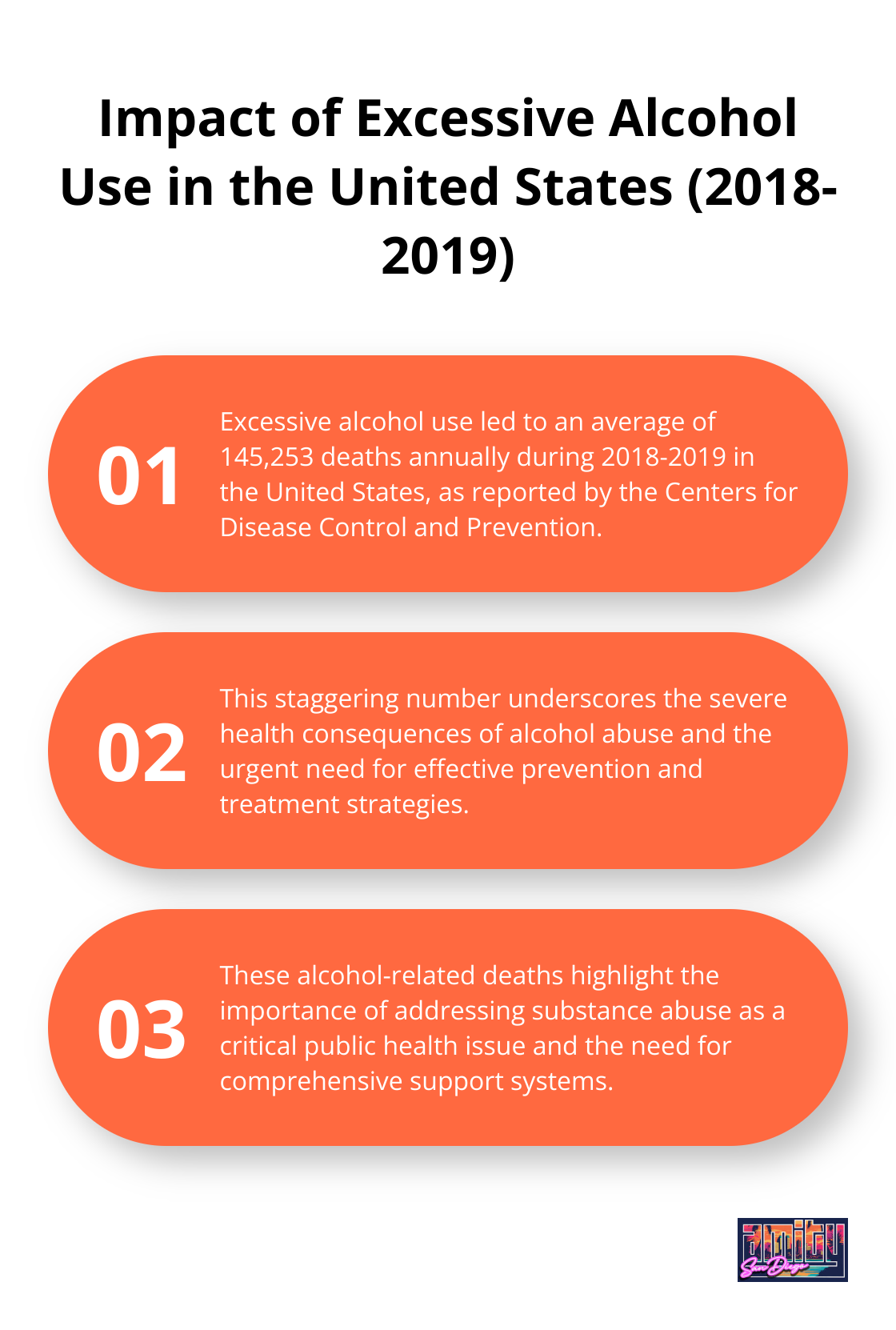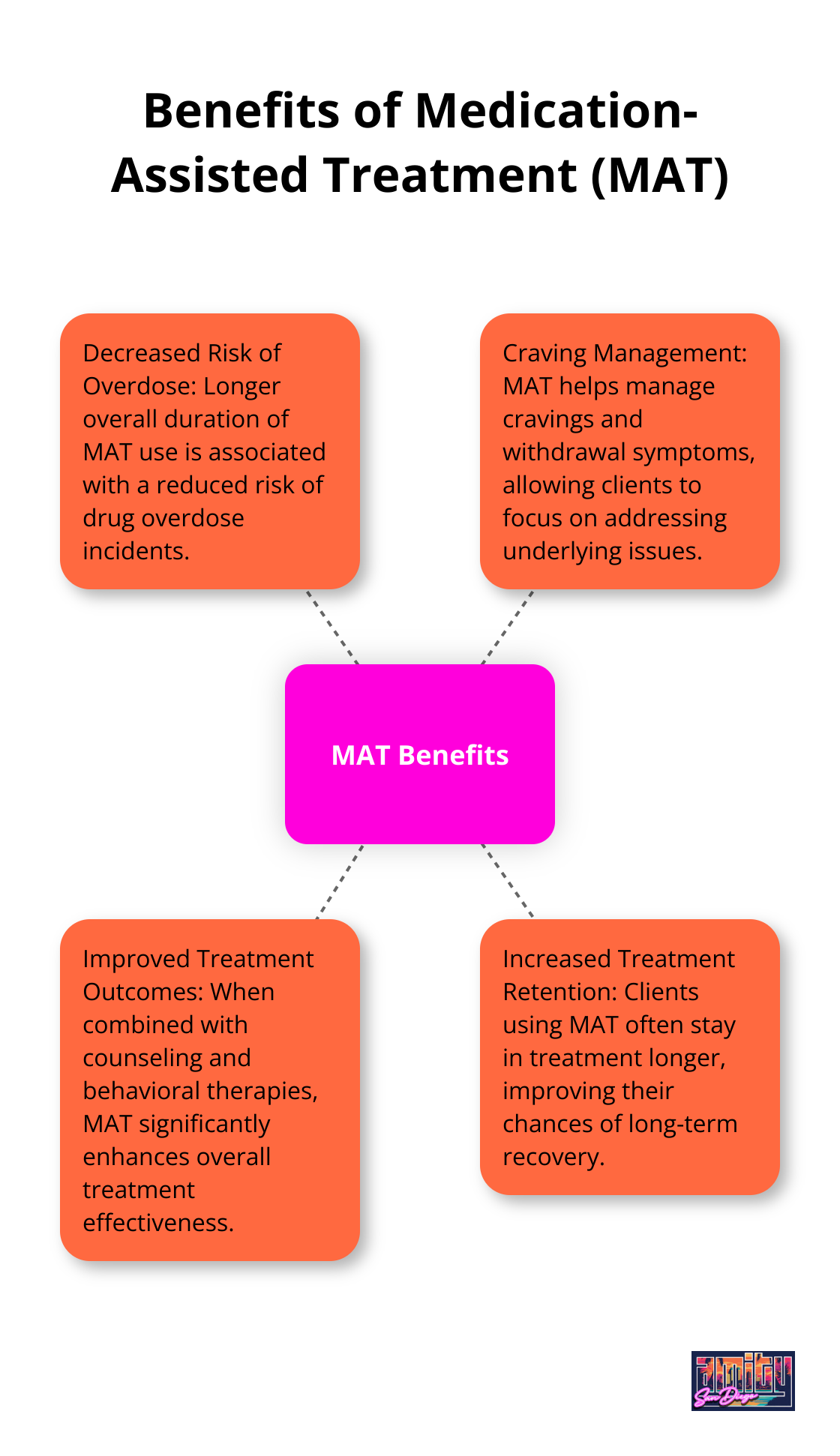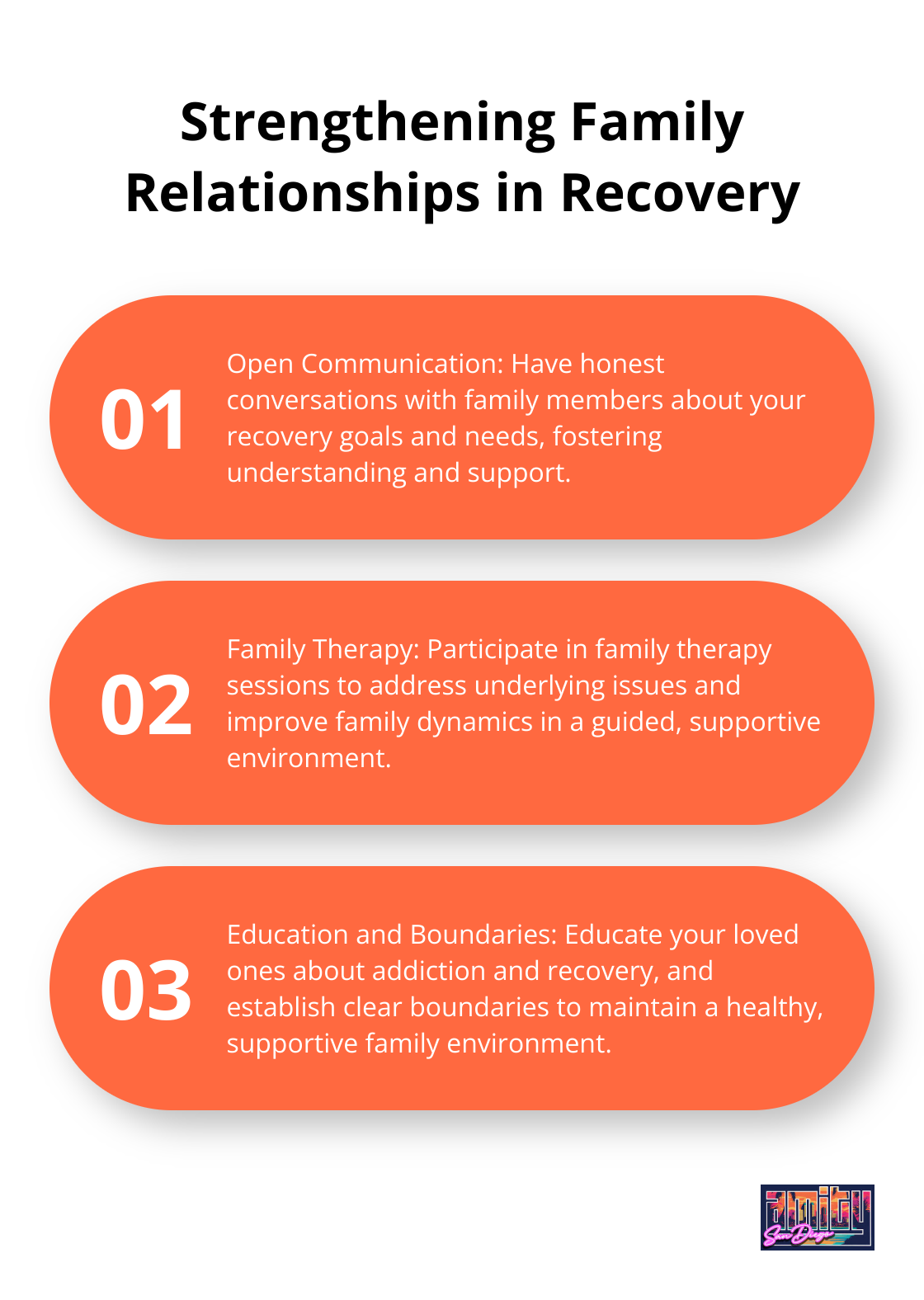At Amity San Diego, we understand the complex challenges of substance abuse and its far-reaching impacts on individuals and communities.
Our team is committed to providing effective strategies and support for those struggling with addiction.
In this post, we’ll explore evidence-based approaches, the importance of a strong support system, and practical tools for managing substance abuse and starting the journey to recovery.
Understanding Substance Abuse and Its Impact
Definition and Types of Substance Abuse
Substance abuse is a pervasive issue that affects millions worldwide. We at Amity San Diego define it as the harmful or hazardous use of psychoactive substances, including alcohol and illicit drugs. This pattern of use often leads to significant health, social, and economic problems for individuals and communities.
The National Survey on Drug Use and Health reports on substance use, mental health, and treatment in the United States. This staggering number underscores the widespread nature of this problem. Substance abuse doesn’t discriminate; it affects people of all ages, backgrounds, and socioeconomic statuses.
Physical and Mental Health Consequences
The health consequences of substance abuse can be severe and long-lasting. Chronic substance use often results in liver disease, heart problems, and increased risk of certain cancers. The Centers for Disease Control and Prevention reports that excessive alcohol use led to an average of 145,253 deaths annually during 2018-2019 in the United States.

Mental health is equally impacted. Substance abuse frequently co-occurs with mental health disorders such as depression, anxiety, and bipolar disorder. The National Institute on Drug Abuse states that about half of those who experience a substance use disorder will also experience a mental illness at some point in their lives (and vice versa).
Social and Economic Effects
The ripple effects of substance abuse extend far beyond the individual. Families often bear the brunt of a loved one’s addiction, experiencing emotional distress, financial strain, and breakdown of relationships. Communities grapple with increased crime rates, homelessness, and strain on healthcare systems.
Economically, the cost of substance abuse is astronomical. The National Institute on Drug Abuse estimates that drugs cost Americans more than $700 billion a year in increased health care costs, crime, and lost productivity.
Treatment Approaches
At Amity San Diego, we recognize the multifaceted nature of substance abuse and its far-reaching impacts. We offer comprehensive, personalized treatment plans that address not only the substance use but also the underlying factors contributing to addiction. Our evidence-based approaches, combined with compassionate care, provide a solid foundation for recovery.
The journey to recovery is unique for each individual. Some may benefit from outpatient programs, while others might require more intensive inpatient care. Medication-Assisted Treatment (MAT) has shown promising results for many, especially when combined with behavioral therapies. Holistic approaches, including nutrition and exercise, also play a crucial role in the recovery process.
As we move forward, it’s important to explore these treatment approaches in more detail. The next section will discuss evidence-based strategies that have proven effective in managing substance abuse and supporting long-term recovery.
Evidence-Based Treatment Approaches for Substance Abuse
Cognitive Behavioral Therapy (CBT)
Cognitive Behavioral Therapy (CBT) stands as a cornerstone in substance abuse treatment. This method helps clients identify and change negative thought patterns and behaviors associated with substance use. CBT has demonstrated efficacy as both a monotherapy and as part of combination treatment strategies for substance use disorders.
We teach practical CBT techniques like the STOP method:S – Stop what you’re doingT – Take a deep breathO – Observe your thoughts and feelingsP – Proceed mindfully
This simple tool allows clients to pause and reassess before engaging in substance use.
Medication-Assisted Treatment (MAT)
For some clients (particularly those struggling with opioid or alcohol addiction), MAT can significantly improve outcomes. Longer overall duration of MAT use is associated with a decreased risk of overdose.

FDA-approved medications like buprenorphine, naltrexone, and acamprosate are offered in combination with counseling and behavioral therapies. It’s important to understand that MAT does not replace one addiction with another – it serves as a tool to manage cravings and withdrawal symptoms while clients address underlying issues.
Motivational Interviewing and Group Therapy
Motivational Interviewing, a client-centered approach, helps individuals find their own reasons for change. This method yields remarkable results, especially when combined with group therapy.
Group therapy provides peer support and accountability. Recovery Management Checkups (RMC) have consistently produced better substance use outcomes and quicker reentry into treatment during relapses than have assessments without intervention.
Specialized groups focus on topics like relapse prevention, stress management, and healthy relationships. These groups provide a safe space for clients to practice new skills and learn from others’ experiences.
Holistic Approaches
Treating the whole person (not just the addiction) involves incorporating holistic approaches like nutrition counseling and exercise programs into treatment plans.
The National Institute on Drug Abuse reports that regular exercise can reduce drug use and relapse. Yoga classes, guided meditation sessions, and access to fitness facilities help clients build healthy habits that support their recovery.
Nutrition programs educate clients on how proper diet aids recovery. Many people in early recovery are deficient in key nutrients, which can exacerbate mood swings and cravings. A personalized nutrition plan supports both physical and mental health during the recovery process.
These evidence-based approaches form the foundation of effective substance abuse treatment. However, tailoring the approach to each individual’s needs remains paramount. What works for one person may not work for another, which necessitates a range of options and continuous assessment and adjustment of treatment plans.
The next section will explore the importance of building a strong support system in recovery, a critical component that complements these evidence-based treatment approaches.
Building Your Recovery Support Network
Family and Friends: Your First Line of Support
At Amity San Diego, we recognize the importance of family and friends in recovery. Research indicates that families are powerful resources for enhancing treatment and recovery success among youth with substance use disorders. To strengthen these relationships:

- Have open conversations about your recovery goals and needs.
- Participate in family therapy sessions to address underlying issues.
- Educate your loved ones about addiction and recovery (many treatment centers offer family education programs).
- Establish clear boundaries to maintain a healthy, supportive environment.
Support Groups: A Pillar of Ongoing Recovery
Support groups offer a unique opportunity to connect with others who understand your struggles. Group therapy in substance use treatment helps clients learn recovery strategies, build skills, and improve treatment engagement and coping skills. To maximize the benefits of support groups:
- Explore different types of groups (12-step, SMART Recovery, etc.) to find the best fit.
- Attend meetings regularly, even when you feel strong in your recovery.
- Consider becoming a sponsor or mentor once you achieve stable sobriety.
- Use online support groups to supplement in-person meetings, especially during challenging times.
Creating a Sober Social Network
Building a social life that supports your recovery is essential. Here’s how to expand your sober social circle:
- Join sober meetup groups or clubs focused on hobbies you enjoy.
- Volunteer for causes you care about to meet like-minded individuals.
- Participate in alumni events offered by your treatment center.
- Explore sober living communities if you need a more structured environment.
Quality matters more than quantity when it comes to supportive relationships.
Professional Support: A Key to Long-Term Success
Ongoing professional support significantly improves long-term recovery outcomes. Common relapse prevention strategies include therapy and skill development, medications, and monitoring. To maximize the benefits of professional support:
- Schedule regular check-ins with a therapist or counselor, even after completing intensive treatment.
- Work with a recovery coach for personalized guidance and accountability.
- Attend outpatient programs or aftercare services offered by your treatment center.
- Reach out for additional support during high-stress periods or when facing triggers.
Seeking help demonstrates strength, not weakness. Your journey to lasting sobriety is supported by the connections you forge and maintain along the way.
Final Thoughts
Substance abuse recovery requires a personalized approach. We at Amity San Diego combine evidence-based treatments with holistic therapies to create comprehensive healing plans. Our experienced team provides compassionate care tailored to each individual’s unique needs.
A strong support network plays a vital role in long-term recovery success. This includes family, friends, support groups, and professional guidance. These relationships offer encouragement, accountability, and understanding throughout the recovery journey.
Don’t wait to take the first step towards a healthier life. Our outpatient programs can support your path to recovery. With determination and the right help, you can overcome substance abuse and reclaim your future.

